Why Putin is a Hero to Russians
The Americans wrecked Russia. Putin brought it back. That’s why Russians love him. That’s why Americans hate him.

To explain the popularity of Vladimir Putin to my fellow Americans, I often say that to Russians, Putin is a version of FDR and JFK — all rolled into one.
First, Putin is a sort of FDR because he rescued Russia from the economic death spiral that destroyed the country after the collapse of the Soviet Union.
Secondly, Putin is an inspirational figure with the cachet, dynamism and swagger of JFK. He has seized the imagination of Russians, encouraged them to be proud of their country and given them real reasons to be proud.
The most popular leader on earth?
Vladimir Putin ended the year 2022 on a high when it came to his popularity. In fact, polls conducted by the Levada Center in Russia placed his favourability rating at OVER 80%.
I know that to Western readers this seems improbably high, but the numbers are reliable. The Levada Center is a respected and universally recognised polling authority in Russia. They are funded by the University of Wisconsin in Madison, and are known, in fact, for their “pro-Western bias” — so much so that in 2016, the Russian Ministry of Justice placed the Levada Center on the register of NGOs performing the functions of foreign agents.
The center has been polling the Russian people on how they feel about their leader. The fact is, Putin’s approval rating soared when he invaded Ukraine, and it continues to be sky high.
So why is Putin so popular? To understand this, you need to look into the modern history of post-Soviet Russia.
The “Rape of Russia” under Clinton-Yeltsin
It is no secret that the West took advantage of Russia after the fall of the USSR. Russians recall that their country fell suddenly under the spell of Western powers, and everything was changing — for the worse — under the drunken mess that was Boris Yeltsin.
Mortimer Zuckerman, member of the Council on Foreign Relations (CFR), owner of US News & World Report, described what took place in the looting of Russia under Boris Yeltsin as “the largest giveaway of a nation’s wealth in history”.
“The giveaway, or more precisely “theft,” was done through outright robbery, currency war, and a fraudulent loans-for-company stock shares program that was a precondition demanded by Washington to getting aid and loans from the World Bank and the IMF — aid and loans that “never touched ground in Russia,” as Zuckerman noted.”
Indeed, the 1990’s was a horrible decade for Russia and for Russians. Under Bill Clinton, the U.S. sent a team of Harvard-based economic “advisors” intent on “modernising” the Russian economy. The results proved disastrous.
The Clinton-Yeltsin partnership led to a “fire sale” of the wealth and assets of Russia, focused primarily on creating an oligarchy that the West could deal with.
Under Clinton and Yeltsin, Russia was submerged in the American Neoliberal dream: privatization, deregulation, austerity, and the opening up of Russia’s companies to purchase by American oligarchs and newly minted Russian oligarchs alike.
Marc Rich and his “kids”
The Russian oligarchs didn’t just come up with the idea to loot Russia themselves — They learned from the disgraced U.S. financial fixer and Clinton insider Marc Rich. He taught the young Russian entrepreneurs, former KGB and Communist Party officials, how to manipulate the system.
As Paul Klebnikov wrote in his book, “The Godfather of the Kremlin”:
“Marc Rich ended up being a mentor to all these young kids who came out of the Communist Party establishment and who made billions off these schemes themselves. Applying the lessons they learned from Marc Rich, they bankrupted Russia. As a result, you have a ruined economy, bankrupt government and an impoverished population.”
The Harvard Boys
The looting of Russia had begun after Yeltsin, advised by Clintonite consultants from Harvard like Jeffrey Sachs and Larry Summers, applied neoliberal “shock therapy” to the Russian economy by privatising everything. In short order, American capitalists and their Russian collaborators took over Russian industries.
In fact, several members of that disgraced Harvard consulting group as well as Harvard University itself were later sued for their misuse of USAID money in Russia. But that all happened too late to help the Russians.
Robert Krainer, an investigative journalist who studied Russia’s collapse, summarised the failed effort in his 2017 book:
“It is clear that shock “therapy” was little more than a relentless, cruel strangulation of Russia’s economy to facilitate looting of her vast industrial and resource wealth”.
“Russia’s Road to Corruption”
In September 2000, The United States Congress issued a damning report entitled “Russia’s Road to Corruption”. The report documented how the Clinton Administration had destroyed the Russian economy and Russian society itself.
Here is an excerpt from that official Congressional report:
By…transforming state-owned monopolies into private monopolies, instead of building the fundamentals of a free enterprise system, the Clinton administration ensured that billions in Western economic assistance to Russia would amount to mere temporising.
The oligarchic economy, created with the advice and assistance of the Clinton administration, also tightened the stranglehold of official corruption over the Russian government and the large sector of the ostensibly “privatized” economy that it influenced. This official corruption both obstructed law enforcement and created a symbiotic relationship between corrupt government officials and organized crime, assisting them in laundering money and in the commission of other crimes.
Indeed, in Russia the Clintonites had managed — in just a few years — to create a corrupt, crony capitalist system that it has taken decades to create in their own country.
But their schemes all depended on a pliable, drunken Yeltsin to rubber stamp their plans and implement them through his “dictatorial” Presidential decrees.
By 1996, Russians had become angry and disillusioned with Yeltsin, and it seemed like the opposition Communist Party might win the upcoming Russian elections.
The Americans, worried that their privatisation gravy train might get derailed, jumped in with both feet and did everything they could to ensure their patsy remained in office.
How the U.S. decided Russian elections
I am old enough to remember how the U.S. took credit for getting Yeltsin re-elected in 1996. How utterly absurd and ironic that Americans now accuse Russia of interfering, when America’s own interference in Russian politics was even proclaimed on the cover of TIME Magazine:
Of course - America being America - Hollywood just HAD to make a movie about how a gang of intrepid U.S. advisors managed to get a tottering drunk re-elected President of Russia.
The movie, “Spinning Boris”, is rated 53% by Rotten Tomatoes.
“Worse than the Great Depression”
The result of U.S. meddling in Russia was the immiseration of the Russian people. Under the tender mercies of the Clinton-Yeltsin cabal of Russian oligarchs and American “advisors”, all operating according to the playbook of unfettered Neoliberalism, Russians were pitched into utter destitution.
A CEPR report explains:
The data clearly show the devastation that this failed transition imposed on the Russian people. According to the United Nation’s Human Development Report, Russia’s per capita income fell by one-third between 1990 and 2000, a decline that dwarfs the falloff in the Great Depression in the United States. This had enormous consequences in the daily lives of the Russian people as the system of social supports that provided basic services collapsed with nothing to replace it.
The U.S. Congressional Commission report confirms the U.N. findings:
The culmination of the Clinton administration’s fatally-flawed macroeconomic policy for Russia occurred in August 1998, when Russia’s default on its debts and devaluation of the ruble led to the nation’s total economic collapse. By all measurements, the disaster was worse than America’s Crash of 1929.
Millions of ordinary men and women who had deposited their money in Russian banks lost everything. ATM and debit cards ceased to work. Dozens of banks became insolvent and disappeared. Angry depositors besieged Russian banks, only to learn they had been wiped out. Millions of senior citizens, whose meager pension income had been suspended for months, were cut off completely.
When the dust finally settled in March 1999, the ruble — and with it, every Russian’s life savings — had lost fully 75% of its value. The devastation of Russia’s economy was worse than what America experienced in the Great Depression.
The double whammy: Neoliberalism and Globalism
Journalist Anne Williamson, who wrote a book detailing the Rape of Russia, gave testimony to the U.S. Congress in 2000. She summed up the events in Russia during the 1990s thusly:
“…thanks to Boris Yeltsin’s thirst for power and megalomaniacal inadequacy, Russia has become the latest victim of American expediency and of a culturally hollow and economically predatory globalism”.
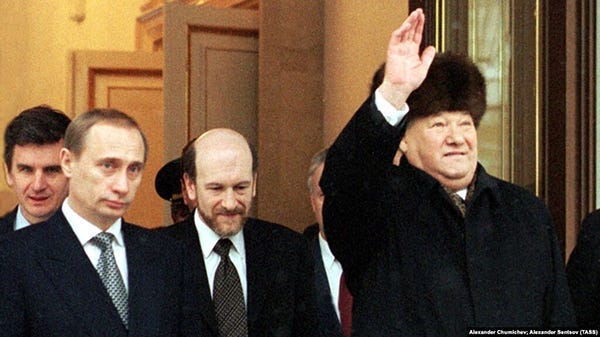
Putin: A new sheriff in town
Just as FDR saved Americans from the Great Depression, Vladimir Putin saved Russians from the ravages visited upon them by the Neoliberal West.
Putin put an end to the “Rape of Russia” after he took office in the elections of 2000. He started by pushing through a number of populist reforms for criminal, tax, and land laws (which had been opposed by oligarchs in the 1990s).
For example: Putin nationalised YUKOS, the Russian state oil and gas giant, which Mikhail Khodorkovsky had acquired under Yeltsin for a pittance. The Russian government then presented Yukos with a series of tax claims totalling US$27 billion (€20,1 billion). Unable to pay, Yukos’s oligarch owner Khodorkovsky was tried and served 10 years in jail.
Putin was the new sheriff in town, and he started cleaning house, bringing criminal charges against Marc Rich’s oligarch proteges for unpaid taxes and illegal dealings. Under this new regime, some oligarchs were convicted, some fled.
Russians literally “owe their lives” to Putin
Russians soon began to realise a real and tangible improvement in their lives. They literally started to live better — and longer.
The CEPR reports that under Clinton-Yeltsin, Russians had started living shorter lives. Life expectancy fell from 68 in 1990 to 65 in 2000, “a drop implying that millions of people would be dying at a younger age than would have been the case a decade earlier“.
Putin turned this around:
Paying off Russia’s debts while forgiving debtors
Another of Putin’s agenda items was to pay off (early) all debt to the IMF. This he has done. Putin also paid off holdover loans from the Soviet era.
At the same time, Russia has written off a large part of the debt developing countries owed it. For example, Russia forgave more than $30 billion in debt owed by Cuba. In total, Russia has forgiven more than $100 billion in debt owed by developing countries over the past decade.
As a result of Putin’s financial stewardship, Russia is now the ONLY “first tier” nation NOT operating on a “debt-based system”. In fact, Russia’s national debt today is still only 20% of GDP — a mere fraction of that of the U.S., which stands at 125%.
As part of the financial turnaround, Putin has also restored and increased Russia’s gold reserves.
The blowback from sanctions propels Putin to new heights
It should also be noted that Putin’s popularity has increased since sanctions were first imposed on Russia. This should come as no surprise, however.
For the last 60 years, every time the U.S. has imposed sanctions or blockaded a country, it has ALWAYS made the leader of that country more popular. That is because people are not stupid; they know who is imposing the sanctions; they know who is hurting them; and they know who is defying, fighting, and standing up to the ones who are hurting them.
U.S. sanctions ALWAYS end up only one way: the popularity of the national leader goes UP, and the popularity of the USA goes DOWN.
What Putin’s Success Can Teach us
As I mention above, Russia was subjected to economic “shock therapy” in which Clintonite Neoliberals had free rein to rapidly introduce their own brand of crony, corrupt capitalism (also known as just “capitalism”).
The Russians reacted strongly to the “therapy” foisted upon them by the “Harvard Boys”. They welcomed Putin. They rejoiced that he was a patriot, a nationalist, a populist, a former intel officer who could, they believed, deal forcefully with the slippery, corrupt Western financiers — as well as their own home-grown criminal oligarchs.
And Putin delivered.
Putin and the Story of the Frog in Hot Water
In comparing the Russians’ lived experience with that of us living in the collective West, I am reminded of the story of the frog in hot water.
The premise of that story is that if a frog is put suddenly into boiling water, it will jump out, but if the frog is put in tepid water which is then brought to a boil slowly, it will not perceive the danger and will be cooked to death.
The Russians, being thrown into the boiling cauldron of what Anne Williamson called predatory globalism, rejected that system and fell back onto more traditional nationalism. In short, they were ready to buy what Putin was selling. And they are still buying it.
For most Americans and, to a lesser extent, Europeans, we are slowly boiling to death under that Neoliberal globalist system.
As I mentioned above, I am old enough to remember the 1990s. I know that Americans also suffered under Bill Clinton and his Neoliberal agenda. NAFTA, the Telecommunications Act, the “End of Welfare” and the imposition of austerity, massive business and bank deregulation and other Neoliberal policies that Clinton enacted have taken their toll. In some cases, the damage done by Clinton and his ilk took years to manifest, but like the tepid water starting to boil, time has led to America’s own Neoliberal nightmare.
The great accomplishments of FDR are being destroyed, dismantled and privatised bit by bit. Every year, we see labour lose ground; we see wages and benefits decline while the cost of living rises; we we see more and more of our Commons transferred to private ownership. In general, we see the few becoming more wealthy, while most of us become poorer in real terms.
Indeed, studies have shown that the US stopped being a democracy years ago. America is now most decidedly an oligarchy, whose government responds only to the will of the top elites.

It is no wonder, then, that Western leaders have such low approval ratings compared to Putin. They are not, after all, working on behalf of those people polled. They are relying on propaganda and flimflam to bamboozle the masses into liking them. Identity politics has replaced actual policy initiatives in the quest for votes.
Russia shows us that it doesn’t have to be this way.
I know this sounds crazy, but …
Perhaps it would be a good thing for most people in the West if we all had leaders who were more like Vladimir Putin: populist nationalists who are less focused on working for the global elites and more focused on delivering for their people.
#End.
If you liked this post, please consider leaving me a tip! Donations support my independent, ad-free writing.
===========================================================================


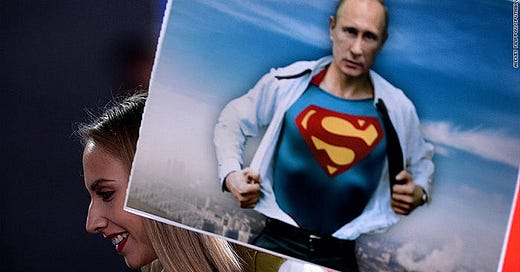



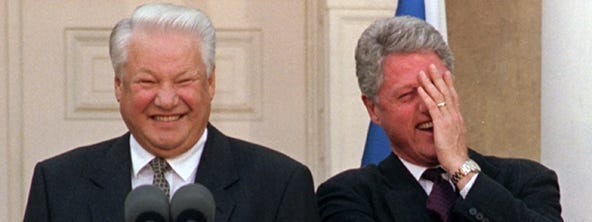
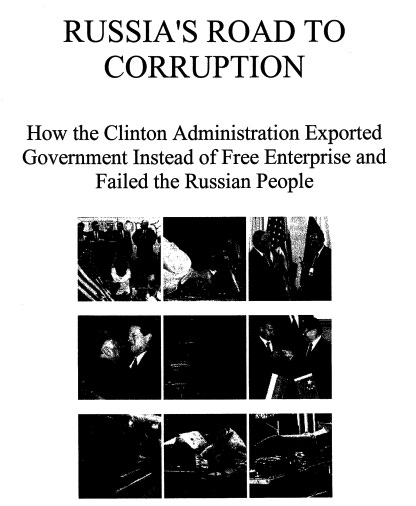






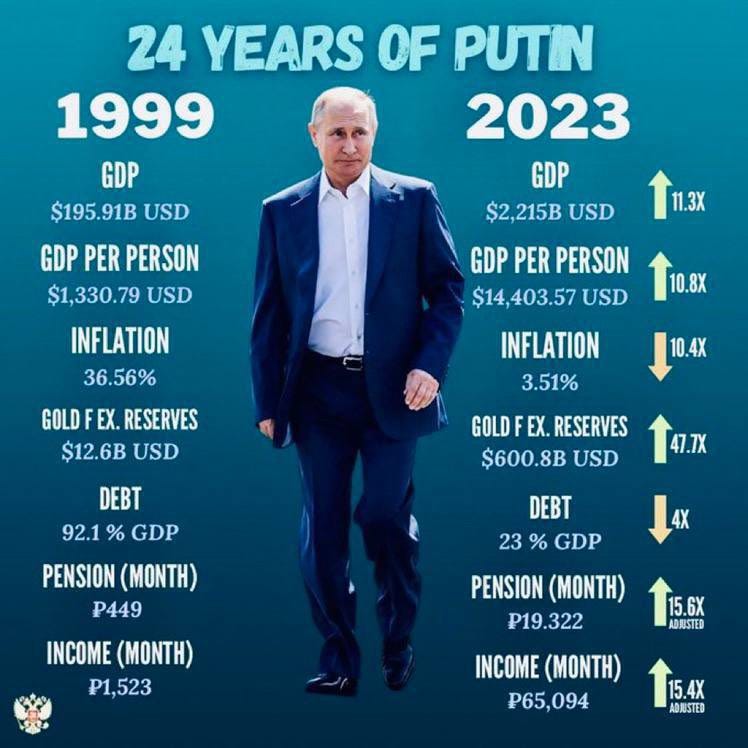
Thanks for this enlightening article. I was alive in the 90s too, but way too busy raising kids and trying to keep bread on the table to realize how deadly neoliberalism was. It's obvious to me now. It's time we in the West threw these oligarchs in jail like Putin has done. Bravo for him and the Russian people!